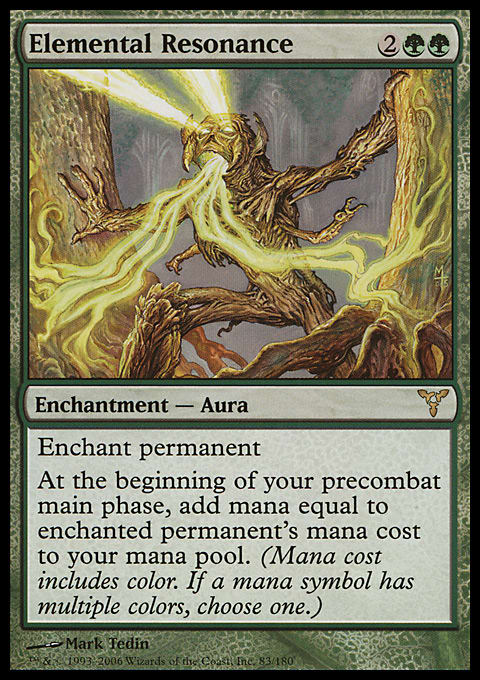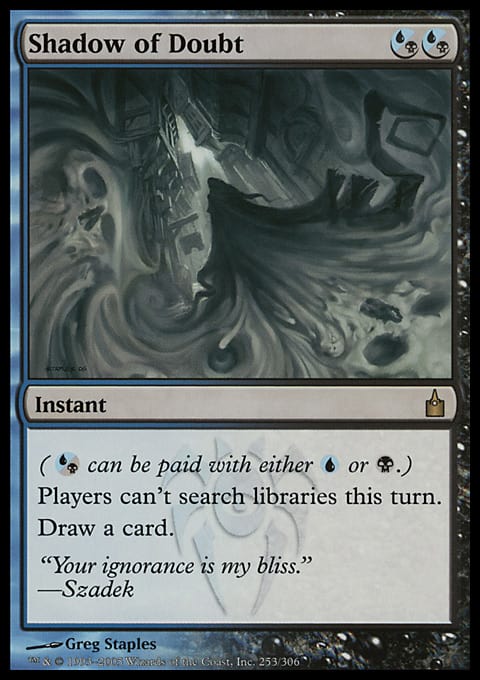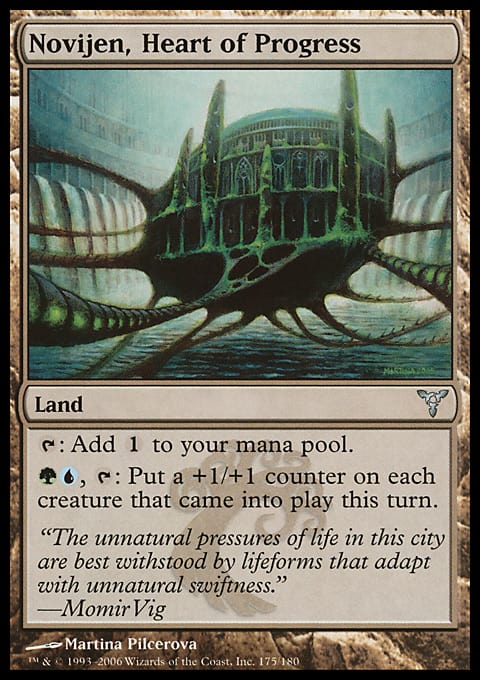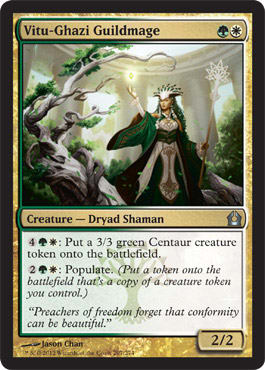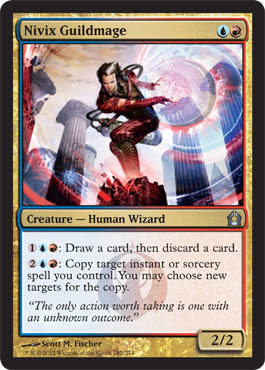The Gatecrash prerelease has come and gone, and we have finally been able to play with the new and improved versions of all ten guilds. I, of course, played as the Simic Combine: the guild of researching things that don't blow up. The guild of nurturing growth. The guild of looking at two things and wondering if they really need to be two things or if they could become one thing. I have a strong affinity for the Combine—if gaming psychology isn't an unholy Simic-style hybrid monster, I don't know what is.
I have long been fascinated by the flavor of Ravnica. I began playing seriously right at the end of Dissension, so the guilds have been with me from the beginning. And I am clearly not the only one who is drawn to the guilds. People may be attracted to them for a variety of reasons—gameplay, flavor, who knows what—but one thing is certain: The guilds resonate.

Tifa Meyen knows her guild well.
In my mind, they represent a pursuit of passion in a way that the roles of other planes don’t seem to. The guilded characters of Ravnica live their lives with a clear sense of purpose, embracing their aptitudes and interests and pursuing them as far as humanly possible. This leads to vibrant institutions and a diverse, interdependent world.
One reason that I appreciate this is because I see it as tapping into to one of my favorite fields of study: positive psychology. In the words of founder Mihaly Csikszentmihalyi, “ . . . psychology is not just the study of pathology, weakness, and damage; it is also the study of strength and virtue” (Seligman & Csikszentmihalyi 7).
Positive psychology has its roots in World War II–era Europe. Researcher Mihaly Csikszentmihalyi recalls the idea coming to him as a child, as he watched many of the adults around him being overcome by adversity. Noticing that some people managed to stand strong, he began to wonder about the source of their steadfastness (Seligman and Csikszentmihalyi 6). This led to an overall exploration of what leads to successful and meaningful lives (Seligman & Csikszentmihalyi 7).
Signature Strengths
One theory of success is found in a major book on positive psychology: “Authentic Happiness” by researcher Martin Seligman. When I first heard about it, I was a bit leery, as it sounded to me like pop psychology, but a bit of delving revealed that Seligman’s work is backed by solid empirical research.
In this book, Seligman presents the idea that using certain strengths is one of the keys to success and a satisfying life (Seligman 13). He talks about the idea of signature strengths—the traits that feel most natural and desirable for you to use.
Seligman identified twenty-four strengths that were common across cultures (Seligman 139), divided into six categories of “virtues.” They are as follows:
|
|
|
Here is my perspective on where the various guilds fall in terms of strengths. Your mileage may vary; I’d love to hear what my Vorthos readers think.

Now, pretty much everybody has all of these to one degree or another. However, only a few are considered “deeply characteristic” to any given person (Seligman 13). Seligman identifies a few criteria that help clarify which strengths are signature, including:
- You feel that the strengths represents your true self.
- You spontaneously create projects that make use of the strengths.
- You feel a desire to find more ways to use them.
- You feel excited and refreshed when using them, rather than depleted (Seligman 160).
To help you determine your strengths, the University of Pennsylvania hosts a “Values in Action Survey of Character Strengths.” This test takes about twenty-five minutes and tells you what five strengths it has determined to be most characteristic of you.
Identifying Your Strengths
Why do we even need a quiz? You’d think it would be easy to recognize your strengths. You’d think it would be easy to tell what you’re good at, what lights you up. But according to research, a full third of workers were unable to spontaneously identify their strengths (Hill, qtd. in Forest et al. 1234).
Although I don’t know exactly why this is, I suspect one reason is that certain strengths are prioritized in our culture more than others. A study of strengths use in the workplace found that strengths related to self-control and working hard were emphasized regardless of the employees’ actual strengths (Money et al., qtd. in Niemic). This is not ideal, as using signature strengths is important for work engagement no matter what those strengths are (Application of Signature Character Strengths, qtd. in Niemic).
Some people seem to have a strong instinctive understanding of their true natures. Many of these people seem to take the guild system to heart, embracing ones that call to something deep in who they are. There were so many times I smiled to see people choose their guilds, as it often captured something that I loved about them—Selesnya for someone who had nurtured the judge community, Azorius for a friend who always had the answers, Rakdos for my bold and exuberant little sister.
One interesting phenomenon that I noted was people asking me what I thought their guild should be. After we talked through their thought processes, it became clear to me that for some people, there were differences between which guild they wanted to represent them and which guild they suspected or even feared fit them best.
It is easy to feel ambivalent about your signature strengths, as I personally found. For one of my classes, we had to take the survey of character strengths that I mentioned earlier. This was to help us write our internship application essays, so I was hoping for something like “citizenship and teamwork” or “kindness and generosity.” You know, something helping-professions-esque.
When I received my results, I was honestly dismayed. Four of my top five strengths were in the “knowledge” category—yes, I knew that I am one of the geekier psychologists-in-training out there, but it was still a bit surprising to see it in black and white like that.
This was at the beginning of the school year, coming right on the heels of the guild quiz. Just weeks before, I had startled myself by not being matched with the community-oriented Selesnya. The odd synchronicity of these results set me to thinking. Sure, I like people—just because something isn't a signature strength doesn't mean you're lacking in it—but when was I at my best? When I'm learning. When I'm sharing information. When I'm experimenting.
Using Your Strengths
To put myself back on track, I resolved to stop trying to do it all and instead focus on doing what I do best. Since I was in the process of applying to internships, this involved choosing sites that valued curiosity and originality as core parts of their missions.
As you might expect, using your signature strengths to work toward your goals leads to better progress (Linley et al. 6). Part of this is that everything just seems to go better when you're using your strengths. However, it is also helpful because goals that grow out of your strengths tend to be self-concordant.
That means they resonate with your authentic self rather than being imposed by others (Linley et al. 8). One of my friends, who identifies closely with Azorius, talked about going to law school by saying, “I guess I’m deliberately immersing myself in the kind of environments where structure and logic are highly valued . . . [i]t just feels natural to like what I like, and identifying it is the first step to making it work for me” (Jen).
Even if your goals are locked in, though, your signature strengths can help you out. In his article Nostalgia vs. Innovation, Mark Rosewater pointed out that one of the best ways to differentiate between the guilds is to show how each of them does the same thing in its own way—in this case, the guild leaders (Rosewater). This is also apparent with the Guildmages—you work for Selesnya? Grow your community. Izzet? Go wild with the knowledge. Ten guildmages, ten completely different approaches. Do it however you do best.
It turns out that this works in real life, too. Researchers had college students take the same survey that I did to identify their signature strengths then taught them an exercise: visualizing and writing about using their signature strengths at work, actually doing it, and then reflecting on what they did. (Forest et al. 1238-1239).
In the study, the researchers found that not only were the students who did the exercise better off than a control group, the reason it worked was that the students became more passionate about their work (Forest et al. 1234). These people were still doing the same work—they were just doing it in a way that was right for them. As a result, they flourished.
And So . . .
A neat thing about the guild system is that there is really no hierarchy. You’re not in Golgari because you weren’t competitive enough for Izzet—you’re in Golgari because you’re meant to be in Golgari. Success isn’t about finding the “correct” path, it’s about finding the path that fits you.
Knowing, embracing, and using your strengths can lead to both success and satisfaction. Ravnica glorifies knowing who you are and making the most of it, and I think we all have a few things to learn from it.
. . . Just not the murder circus part, please.
Works Cited
- Forest, Jacques, Geneviève Mageau, Laurence Crevier-Braud, Éliane Bergeron, Philippe Dubrueil, and Geneviève Lavigne. "Harmonious passion as an explanation of the relation between signature strengths' use and well-being at work: Test of an intervention program." Human Relations. 65.9 (2012): 1233-1252. Web. 28 Jan. 2013.
- Jen. Personal interview. 13 Jan. 2013.
- Linley, P. Alex, Karina M. Nielsen, Raphael Gillett, and Robert Biswas-Diener. "Using signature strengths in pursuit of goals: Effects on goal progress, need satisfaction, and well-being, and implications for coaching psychologists." International Coaching Psychology Review. 5.1 (2010): 6-15. Web. 28 Jan. 2013.
- Niemic, Ryan. "Character Strength Summaries." VIA Institute on Character. VIA Institute on Character, 7 Dec 2012. Web. 27 Jan 2013.
- Rosewater, Mark. "Nostalgia vs. Innovation." Daily MTG. Wizards of the Coast LLC, 15 Oct 2012. Web. 28 Jan 2013.
- Seligman, Martin. Authentic Happiness. New York: The Free Press, 2002. Print.
- Seligman, Martin, and Mihaly Csikszentmihalyi. "Positive psychology: An introduction." American Psychologist. 55.1 (2000): 5-14. Web. 28 Jan. 2013.















